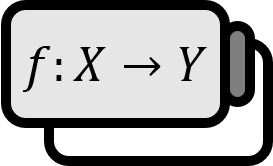Orthogonality of Legendre Polynomials
Theorem
In the interval $[-1,\ 1]$, Legendre polynomials form an orthogonal set.
$$ \int_{-1}^{1} P_{l}(x)P_{m}(x) dx =\frac{2}{2l+1}\delta_{lm} \quad (l, m = 0, 1, 2, \dots) $$
Proof
Case 1: $l \ne m$
Legendre Differential Equation
The following differential equation is called the Legendre differential equation.
$$ \dfrac{d}{d x}\left[ (1-x)^{2} \dfrac{d y}{d x} \right] +l(l+1)y = 0 $$
Since Legendre polynomials are solutions to the Legendre differential equation, they satisfy the above equation. Substituting $P_{l}$ and $P_{m}$ into the equation, we get,
$$ \begin{align*} \dfrac{d}{dx} \left[ (1-x^2)P^{\prime}_{l}(x) \right] + l(l+1)P_{l}(x) &= 0 \\ \dfrac{d}{dx} \left[ (1-x^2)P^{\prime}_{m}(x) \right] + m(m+1)P_{m}(x) &= 0 \end{align*} $$
Multiplying both equations by $P_{m}(x)$ and $P_{l}(x)$ respectively and subtracting, we obtain the following.
$$ \begin{equation} P_{m}\dfrac{d}{dx}\left[ (1-x^2)P^{\prime}_{l} \right] - P_{l}\dfrac{d}{dx}[(1-x^2)P^{\prime}_{m}] + [l(l+1)-m(m+1)]P_{l}P_{m} = 0 \end{equation} $$
Meanwhile, the following equation holds.
$$ \begin{align*} & \dfrac{d}{dx}[(1-x^2)(P_{m}P^{\prime}_{l}-P_{l}P^{\prime}_{m})] \\ &= \dfrac{d}{dx}[{\color{blue}(1-x^2)P^{\prime}_{l}}P_{m}] -\dfrac{d}{dx}[{\color{blue}(1-x^2)P^{\prime}_{m}}P_{l}] \end{align*} $$
Thinking of the blue-painted part as one function and expanding the equation with the product rule gives,
$$ \begin{align*} & \dfrac{d}{dx}[(1-x^2)P^{\prime}_{l}]P_{m}+(1-x^2)P^{\prime}_{l}P^{\prime}_{m}-\dfrac{d}{dx}[(1-x^2)P^{\prime}_{m}]P_{l}-(1-x^2)P^{\prime}_{m}P^{\prime}_{l} \\ &= \dfrac{d}{dx}[(1-x^2)P^{\prime}_{l}]P_{m}-\dfrac{d}{dx}[(1-x^2)P^{\prime}_{m}]P_{l} \end{align*} $$
This is the same as the first two terms of $(1)$. Thus, $(1)$ can be organized as follows.
$$ \dfrac{d}{dx}[(1-x^2)(P_{m}P^{\prime}_{l}-P_{l}P^{\prime}_{m})]+ [l(l+1)-m(m+1)]P_{l}P_{m}=0 $$
Integrating both sides over the interval $[-1, 1]$ yields,
$$ (1-x^2)(P_{m}P^{\prime}_{l}-P_{l}P^{\prime}_{m})\Big|_{-1}^{1} +[l(l+1)-m(m+1)]\int_{-1}^{1}P_{l}(x)P_{m}(x)dx=0 $$
The first term is $(1-x^2)\Big|_{x = \pm 1}=0$, so it becomes $0$. Due to the condition of $l, m$, the constant in front of the integration in the second term absolutely cannot be $0$. Therefore, we get the following.
$$ \int_{-1}^{1}P_{l}(x)P_{m}(x)dx=0 $$
■
Case 2: $l = m$
Recurrence relation of Legendre polynomials
$$ lP_{l}(x) = xP^{\prime}_{l}(x) - P^{\prime}_{l-1}(x) $$
Multiplying both sides of the above equation by $P_{l}(x)$ and integrating gives,
$$ \begin{equation} l\int_{-1}^{1}[P_{l}(x)]^{2} dx= \int_{-1}^{1}xP_{l}(x)P^{\prime}_{l}(x)dx -\int_{-1}^{1} P_{l}(x)P^{\prime}_{l-1}(x)dx. \end{equation} $$
Here, $P^{\prime}_{l-1}(x)$ is a polynomial of degree $l-2$, and since Legendre polynomials are orthogonal to polynomials of lower degree, the last term on the right-hand side is $0$. The first term on the right-hand side can be solved with integration by parts.
$$ \begin{align} \int_{-1}^{1}xP_{l}(x)P^{\prime}_{l}(x)dx &= \int_{-1}^{1}\frac{ x}{2}[2P_{l}(x)P^{\prime}_{l}(x)]dx \nonumber \\ &= \frac{ x}{2}[P_{l}(x)]^{2}\bigg|_{-1}^{1}-\frac{1}{2}\int_{-1}^{1}[P_{l}(x)]^{2}dx \nonumber \\ &= 1-\frac{1}{2}\int_{-1}^{1}[P_{l}(x)]^{2}dx. \end{align} $$
The third equation is valid due to $P_{l}(1)=1$. Therefore, substituting $(3)$ into $(2)$ gives,
$$ \begin{align*} && l\int_{-1}^{1}[P_{l}(x)]^{2} dx &= 1-\frac{1}{2}\int_{-1}^{1}[P_{l}(x)]^{2}dx \\ \implies && \int_{-1}^{1}[P_{l}(x)]^{2} dx &= \frac{2}{2l+1} \end{align*} $$
■
